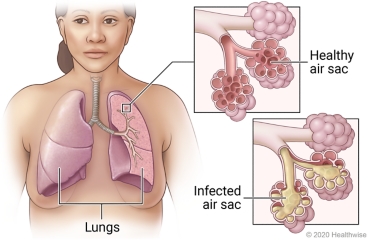
Overview
Pneumonia is an infection of the lungs. Most cases are caused by infections from bacteria or viruses.
Pneumonia may be mild or very severe. If it is caused by bacteria, you will be treated with antibiotics. It may take a few weeks to a few months to recover fully from pneumonia, depending on how sick you were and whether your overall health is good.
Follow-up care is a key part of your treatment and safety. Be sure to make and go to all appointments, and call your doctor if you are having problems. It's also a good idea to know your test results and keep a list of the medicines you take.
How can you care for yourself at home?
- Take your antibiotics exactly as directed. Do not stop taking the medicine just because you are feeling better. You need to take the full course of antibiotics.
- Take your medicines exactly as prescribed. Call your doctor if you think you are having a problem with your medicine.
- Get plenty of rest and sleep. You may feel weak and tired for a while, but your energy level will improve with time.
- To prevent dehydration, drink plenty of fluids. Choose water and other clear liquids. If you have kidney, heart, or liver disease and have to limit fluids, talk with your doctor before you increase the amount of fluids you drink.
- Take care of your cough so you can rest. A cough that brings up mucus from your lungs is common with pneumonia. It is one way your body gets rid of the infection. But if coughing keeps you from resting or causes severe fatigue and chest-wall pain, talk to your doctor. Your doctor may suggest that you take a medicine to reduce the cough.
- Use a vaporizer or humidifier to add moisture to your bedroom. Follow the directions for cleaning the machine.
- Do not smoke or allow others to smoke around you. Smoke will make your cough last longer. If you need help quitting, talk to your doctor about stop-smoking programs and medicines. These can increase your chances of quitting for good.
- Take an over-the-counter pain medicine, such as acetaminophen (Tylenol), ibuprofen (Advil, Motrin), or naproxen (Aleve). Read and follow all instructions on the label.
- Do not take two or more pain medicines at the same time unless the doctor told you to. Many pain medicines have acetaminophen, which is Tylenol. Too much acetaminophen (Tylenol) can be harmful.
- If you were given a spirometer to measure how well your lungs are working, use it as instructed. This can help your doctor tell how your recovery is going.
How can you prevent pneumonia or avoid getting it again?
To help prevent pneumonia, get the recommended pneumococcal vaccines and a yearly flu vaccine. And stay up to date on your COVID-19 vaccines. Wash your hands often to prevent spreading viruses and bacteria that may cause pneumonia. Taking care of your teeth and gums may help prevent some types of pneumonia.
When should you call for help?
Call 911 anytime you think you may need emergency care. For example, call if:
- You have severe trouble breathing.
Call your doctor now or seek immediate medical care if:
- You cough up dark brown or bloody mucus (sputum).
- You have new or worse trouble breathing.
- You are dizzy or lightheaded, or you feel like you may faint.
Watch closely for changes in your health, and be sure to contact your doctor if:
- You have a new or higher fever.
- You are coughing more deeply or more often.
- You are not getting better after 2 days (48 hours).
- You do not get better as expected.
Where can you learn more?
Go to http://www.healthwise.net/patientEd
Enter D336 in the search box to learn more about "Pneumonia: Care Instructions".
Current as of: June 12, 2023
Author: Healthwise Staff
Clinical Review Board
All Healthwise education is reviewed by a team that includes physicians, nurses, advanced practitioners, registered dieticians, and other healthcare professionals.

